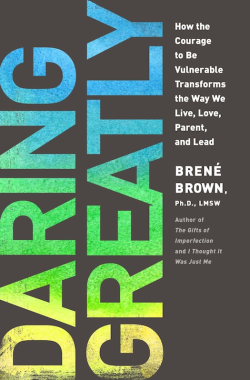 When it came time to name her new book, Daring Greatly: How the Courage to Be Vulnerable Transforms the Way We Live, Love, Parent, and Lead, Brené harkened back to a speech that Teddy Roosevelt gave in 1910. In it, Roosevelt said:
When it came time to name her new book, Daring Greatly: How the Courage to Be Vulnerable Transforms the Way We Live, Love, Parent, and Lead, Brené harkened back to a speech that Teddy Roosevelt gave in 1910. In it, Roosevelt said:
“It is not the critic who counts; not the man who points out how the strong man stumbles, or where the doer of deeds could have done them better. The credit belongs to the man who is actually in the arena, whose face is marred by dust and sweat and blood; who strives valiantly; who errs, who comes short again and again, because there is no effort without error and shortcoming; but who does actually strive to do the deeds; who knows great enthusiasms, the great devotions; who spends himself in a worthy cause; who at the best knows in the end the triumph of high achievement, and who at the worst, if he fails, at least fails while daring greatly.”
The powerful quote resonated with Brown, a research professor at the University of Houston Graduate College of Social Work, who gave the blockbuster TEDTalks “Brené Brown: The Power of Vulnerability” and “Brené Brown: Listening to Shame.” In the introduction to her book — which arrives on shelves today — Brown riffs on Roosevelt’s words, which she says perfectly encapsulate her research into why we find being vulnerable such a hard thing to do.
“When we spend our lives waiting until we’re perfect or bulletproof before we walk into the arena, we ultimately sacrifice relationships and opportunities that may not be recoverable, we squander our precious time, and we turn our backs on our gifts, those unique contributions that only we can make,” says Brown. “Perfect and bulletproof are seductive, but they don’t exist in the human experience.”
Below, read five more inspiring quotes from Brown’s new book.
“I carry a small sheet of paper in my wallet that has written on it the names of people whose opinions of me matter. To be on that list, you have to love me for my strengths and struggles. You have to know that I’m trying to be Wholehearted, but I still cuss too much, flip people off under the steering wheel, and have both Lawrence Welk and Metallica on my iPod.”
“Worrying about scarcity is our culture’s version of post-traumatic stress. It happens when you’ve been through too much, and rather than coming together to heal (which requires vulnerability), we’re angry and scared and at each other’s throats.”
“I define vulnerability as uncertainty, risk and emotional exposure. With that definition in mind, let’s think about love. Waking up every day and loving someone who may or may not love us back, whose safety we can’t ensure, who may stay in our lives or may leave without a moment’s notice, who may be loyal to the day they die or betray us tomorrow — that’s vulnerability.”
“We judge people in areas where we’re vulnerable to shame, especially picking folks who are doing worse than we’re doing. If I feel good about my parenting, I have no interest in judging other people’s choices. If I feel good about my body, I don’t go around making fun of other people’s weight or appearance. We’re hard on each other because we’re using each other as a launching pad out of our own perceived deficiency.”
“Raising children who are hopeful and who have the courage to be vulnerable means stepping back and letting them experience disappointment, deal with conflict, learn how to assert themselves, and have the opportunity to fail. If we’re always following our children into the arena, hushing the critics, and assuring their victory, they’ll never learn that they have the ability to dare greatly on their own.”
For even more insights from Brown, read this Q&A with the TED Blog, in which she answers the question, “What’s the greatest lesson you have learned in your own life?”
Comments (156)
Pingback: How do you react? Active Destructive, or Active Constructive? | Lucacept - intercepting the Web
Pingback: From Simple to Wholehearted | Jammie Kern
Pingback: Don’t Try To Win Over The Haters… | A Fresh Chapter
Pingback: The Motivating Maven Daring Greatly: Essential for Living the Life You Desire | The Motivating Maven
Pingback: “We judge peopl… | The God Spark
Pingback: Changing Arts, Changing Hearts | near life experience
Pingback: Life's Too Short to Rush: Savor the Moment - Big State, Big Life
Pingback: dare all. be all {a personal note} | The Delicate Place
Pingback: Brené Brown: wishing you love and light – Ordinary Courage | The Considered Kula
Pingback: all i want for christmas is « desperately seeking truthbrarian
Pingback: Vulnerability and Courage | QuinnCreative
Pingback: Book Review: Daring Greatly by Brené Brown - Foundation Family Wealth
Pingback: The Power of Vulnerability: "It's where courage meets fear" - Kate Daigle Counseling
Pingback: The LEGO Story | Adam Sigel
Pingback: Love and vulnerability
Pingback: The Courage to Be Vulnerable | The Parent Journey
Pingback: Why You Need to Be Vulnerable to Innovate - Innovation Leadership Network
Pingback: Other Than Mother » Blog Archive » Daring Greatly–a beautiful book preview
Pingback: Where vulnerability meets power: Brené Brown speaks at the Texas Conference for Women | ATX Post
Pingback: 5 insights from Brené Brown’s new book, Daring Greatly, out today | escrevinhandoideias